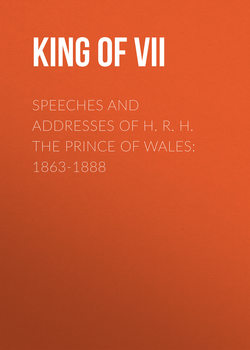Читать книгу Speeches and Addresses of H. R. H. the Prince of Wales: 1863-1888 - King of Great Britain Edward VII - Страница 4
FREEDOM OF THE CITY OF LONDON
ОглавлениеJune 8th, 1863
The first event of importance in the public life of the Prince of Wales, after his marriage, was the taking up the freedom of the City of London, on the 8th of June, 1863. As far back as the 12th of March the following resolution had been passed by the Court of Common Council: —
"That His Royal Highness Albert Edward, Prince of Wales, be very respectfully requested to take upon himself the freedom of the City, to which he is entitled by patrimony; and that upon his acceding to this request His Royal Highness be presented with the copy of the freedom, enclosed in a casket, in testimony of the affection and profound respect entertained by the Court for his person and character."
Having signified his assent to the request, the 8th of June was fixed as the day when the Prince would come to Guildhall to take up the freedom. The Lord Mayor and the civic authorities thought that this would be the fittest time for the official reception of the Prince and Princess, and for an entertainment, worthy of the occasion of the marriage, and of the ancient hospitality of the City of London. Invitations were accordingly issued to about two thousand guests to meet the Royal visitors, and the list included all the most eminent persons in public life or in society, and the ambassadors and representatives of foreign countries. Immense and costly preparations were made, both in the decoration of the Hall, and for the reception of the guests. Shortly after 9 p.m. the sound of trumpets announced that the Royal party had arrived. The Prince wore his military uniform, and the Riband and Star of the Garter. The Princess wore a rich but simple white dress, with coronet and brooch of diamonds, the wedding present of her husband, and the splendid necklace of brilliants which the City of London had presented. With them came Prince Alfred, the Duchess of Cambridge, the Duke and Princess Mary of Cambridge, and other Royal personages, followed by a numerous retinue. The Royal party were conducted to the daïs, in front of which was a table at which the Lord Mayor (Alderman Rose, M.P.), and the City officials took their places, and there resolved themselves into a Court of Common Council. All wore their robes and insignia of office, the sword and mace laid on the table before the Lord Mayor. The resolution passed on the 12th of March having been read, and also the official record of His Royal Highness's title to the freedom, the Prince then read aloud and afterwards subscribed the following declaration: —
"I, Albert Edward, Prince of Wales, do solemnly declare that I will be good and true to our Sovereign Lady Queen Victoria; that I will be obedient to the Mayor of this City; that I will maintain the franchises and customs thereof, and will keep this City harmless, in that which in me is; that I will also keep the Queen's peace in my own person; that I will know no gatherings nor conspiracies made against the Queen's peace, but I will warn the Mayor thereof, or hinder it to my power; and that all these points and articles I will well and truly keep, according to the laws and customs of this City, to my power.
"Albert Edward."
Mr. Benjamin Scott, the Chamberlain, then read an address, at the close of which he offered the right hand of fellowship as a citizen of London, and presented the gold casket containing the record of the freedom. The Prince, in reply, said: —
"My Lord Mayor, Mr. Chamberlain, and Gentlemen, – It is, I assure you, a source of sincere gratification to me to attend here for the purpose of being invested with a privilege which for the reasons you have stated you are unable to confer upon me, and which descends to me by inheritance. It is a patrimony that I am proud to claim – this freedom of the greatest city of the commercial world, which holds its charter from such an ancient date. My pride is increased when I call to memory the long list of illustrious men who have been enrolled among the citizens of London, more especially when I connect with that list the beloved father to whom you have adverted in such warm terms of eulogy and respect, and through whom I am here to claim my freedom of the City of London. My Lord Mayor and Gentlemen, the Princess and myself heartily thank you for the past – for your loyalty and expressions of attachment towards the Queen, for the manifestations of this evening towards ourselves, and for all your prayers for our future happiness."
When the ceremony was ended, the Prince and the Royal visitors withdrew from the Hall, but soon returned to join in the festivities, which began with a ball. "The Lord Mayor led off in a spirited quadrille with Her Royal Highness the Princess, and the Prince with the Lady Mayoress." So runs the record, with details of the dances, and the names of the dancers in the area kept clear, in front of the daïs, for the special guests. Attempts were occasionally made to keep up dancing in the body of the Hall, but the crowd was so great that, till after supper, and the retirement of the Royal party, the fête was more of a grand assembly than a ball. Under whatever name, it was a magnificent entertainment, and aged citizens tell us that Guildhall had never witnessed a scene so splendid and joyous.
